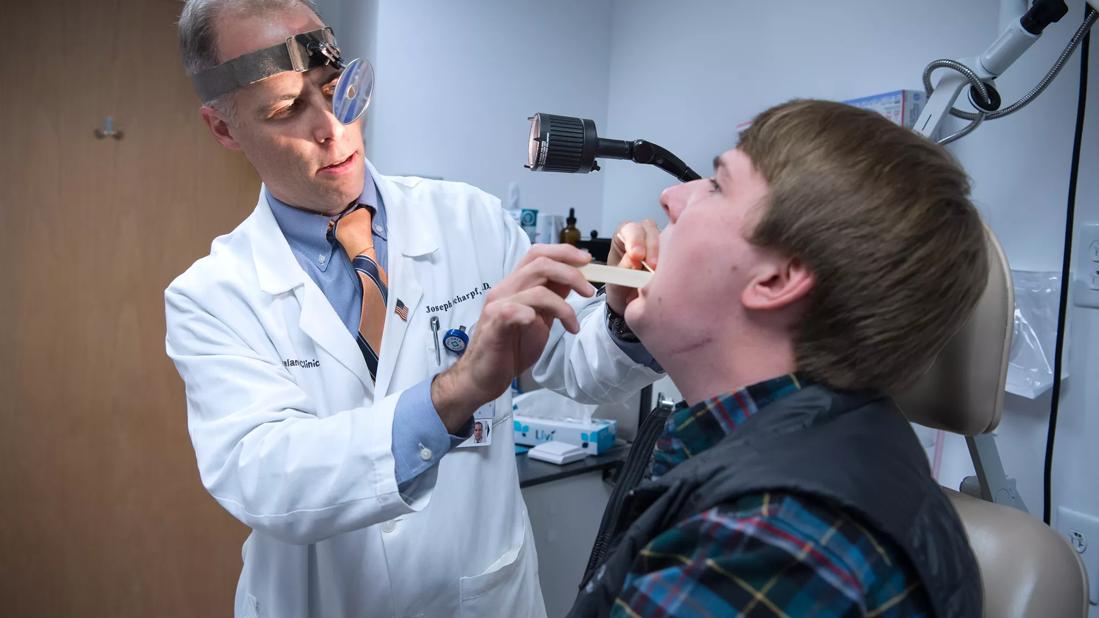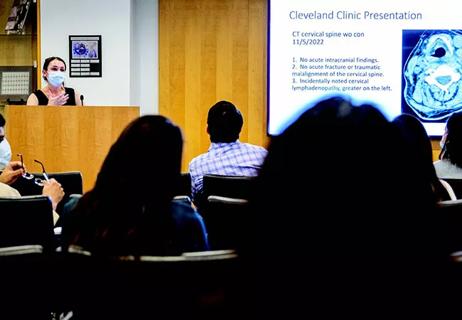A commitment to sharing expertise has fostered a global exchange of ideas

Cleveland Clinic’s mission statement is three-pronged, “Caring for life, researching for health, educating those who serve.”
Advertisement
Cleveland Clinic is a non-profit academic medical center. Advertising on our site helps support our mission. We do not endorse non-Cleveland Clinic products or services. Policy
While the organization is known among patients for its world-class care, and physicians and providers recognize its innovations and research contributions, education has always been a major component. As the global footprint of Cleveland Clinic expanded beyond Northeast Ohio, and then beyond the United States to Abu Dhabi and London, the focus on international education has also expanded.
“I've been here about 27 years, and we've always had a well-known and internationally recognized staff,” says Joseph Scharpf, MD, a head and neck surgeon and Vice Chair for Education in Cleveland Clinic’s Head and Neck Institute. “But I think our global reach has grown with our presence in Abu Dhabi and London. Maybe the world has also gotten smaller now that it’s become easier to communicate and share ideas across continents, but we certainly have more opportunities to make an impact through education now.”
Patrick Byrne, MD, MBA, Chair of Cleveland Clinic’s Otolaryngology-Head & Neck Surgery echoes these thoughts. “This era of growth and educational expansion is strengthening the connections across our global sites in Ohio, Florida, London and Abu Dhabi,” he says. “Our department’s presence in each of these regions — Robert Lorenz, MD, as President of Cleveland Clinic London; Mumtaz Khan, MD, as Chief of Staff in Abu Dhabi and Brian Burkey, MD as Vice Chief of the Integrated Surgical Institute for Florida — reflects our commitment to excellence in care, education and leadership across the world. Under Dr. Scharpf’s leadership as Vice Chair for Education, we are advancing innovative training programs that prepare the next generation of leaders.”
Advertisement
Dr. Scharpf explains that his Vice Chair of Education position is aligned with Cleveland Clinic’s Education Institute under the guidance of James Stoller, MD, MS. “Dr. Stoller’s vision stresses education for all,” says Dr. Scharpf. “Anyone who is part of Cleveland Clinic, our staff, alumni, physicians, nurses, patients, everyone; they all fall under this umbrella.”
He continues, “Our emphasis on global health education takes many forms. Our head and neck surgery staff frequently attend and present at major international meetings. They’ve also gone on several humanitarian trips. Even just our interactions with international patients and providers can be opportunities to educate and learn.”
This past June, Dr. Scharpf presented a lecture on advanced thyroid cancer and treatment implications of molecular testing at the Indian Society of Thyroid Surgeons 6th National Conference in Kolkata, India.
This isn’t uncommon for the department, and many of its staff visit centers of excellence throughout Asia and the Middle East, Europe, North and South America and Australia to lecture on topics and courses specific to those centers.
“Seeing what otolaryngologists are doing in other countries, how they’re adapting to the challenges that they face — fewer resources, for example — and how they’re innovating and pushing medicine forward is valuable,” says Dr. Scharpf. “I always prefer to look at these opportunities as two-way conversations. It's nice to go there and show what we're doing at Cleveland Clinic with our techniques and procedures, but I frequently learn so much on these trips. After a trip to Germany, I learned about their techniques for nerve modernizing, and that’s something I now use in my practice.”
Advertisement
Beyond lecturing and presenting at international meetings, many of the staff are also involved with humanitarian care trips. Several of the pediatric and facial plastic staff get involved with treating cleft lips and palates. On these trips, they are not just providing care for young children with those conditions, but they also share techniques and care tips with the doctors present in those areas.
In addition to traveling, Cleveland Clinic’s Head and Neck surgeons also host courses and lectures at home. A few weeks ago in August, a course on advances in nasal reconstruction provided a platform for leading experts in the field to share their experiences. They discussed management of nasal defects and some of the innovative techniques they rely on to address complex multi-subsite and total nose defects.
In November, Cleveland Clinic Florida will host a microscopic and endoscopic skull base surgery workshop in which attendees will get hands-on experience in different complex approaches as well as discuss the contemporary management issues in patients with skull base pathologies.
The 11th Annual Cleveland Clinic Head and Neck Meeting in Florida, directed by John Greskovich, Jr, MD, and Dr. Scharpf will be held in March 2025. This event always draws an excellent audience from Central and South America.
“I think there’s a real benefit to prioritizing global education efforts both at home and abroad,” says Dr. Scharpf. “When we go and speak at these international events, it helps develop our reputation in these parts of the world. Because we go to so many of these events, we’re able to build relationships with head and neck surgeons across the globe.”
Advertisement
“When we host events, we’re able to stand out a bit more because of our presence at other events,” he continues. “It also allows us to connect with our partners at other Cleveland Clinic centers. An upcoming Otolaryngology HNS Summit and Thyroid Cancer Update 2024 in November at Cleveland Clinic Abu Dhabi will allow us to provide education to a wide audience in that region.”
While the COVID-19 pandemic led to several live society meetings being canceled, Dr. Scharpf believes that the ensuing increase in webinars and the expansion of hybrid meetings has been a silver lining. He notes that since international travel is expensive and attendance may be cost-prohibitive for smaller health centers, having a virtual option helps expand access.
“Early on in the pandemic, I was asked to do quite a few webinars for international society meetings,” says Dr. Scharpf. “These webinars allowed us to still connect with other centers and major educational events, and that was a positive. Now, after engaging with them virtually, we’re seeing them in-person at meetings, and it's been wonderful to build on those connections.”
Advertisement
Advertisement

Maintaining connections leads to referrals, recruitment and more

Continuous Improvement model makes success repeatable

A century-old medical tradition inspired the weekly complex-case reviews in Rheumatology

Medical students will complete five weeks of clinical training

Findings about the tool's utility were presented at the American Society of Nephology’s 2022 Annual Meeting

The program provides an inside look and hands-on experience for high school students interested in nursing

Join us in New York City Dec. 5-6

Program helps participants experience nursing through hands-on exploration